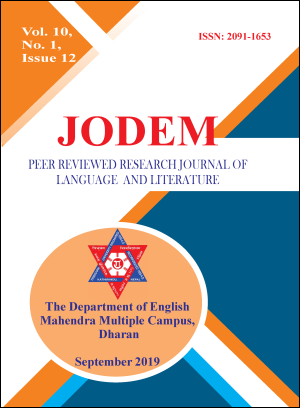A Human not a Woman: Radhika in Bhagat's One Indian Girl
DOI:
https://doi.org/10.3126/jodem.v12i1.38715Keywords:
Denial, identity, independence, patriarchy, socio-cultural stereotypeAbstract
A girl though born and bred as a female whether remains a woman or challenges the socially assigned stereotypical sexual identity and becomes a human, is the matter of her choice. Chetan Bhagat’s One Indian Girl best illustrates this issue with a suggestive note for the latter. The central character Radhika Mehata, the Indian girl, is his mouthpiece in the novel. This paper analyzes the socio-cultural making of a woman across cultures with critical insights envisioned by Simone De Bauvoir in her seminal book The Second Sex and Sturt Hall’s notion of ‘being’ and ‘becoming’ regarding one’s identity. The researcher argues that Radhika though a born female denies her socially given sexual identity of a woman, the second sex, to enjoy her life by becoming a fully-fledged human being. This article examines how she asserts a self constructed identity for herself as well as exerts independence and freedom that are taken as a male prerogative in patriarchal societies like ours. In doing so, the article imparts voice to the voiceless women who in the course of aspiring to be free and self-sufficient but are undergoing a tougher struggle in their lives at contemporary times. It also discusses how the stereotypically demeaning treatment by male chauvinists can be overcome by the females who want to pioneer their own unfettered being and live a life of their own choice.
Downloads
Downloads
Published
How to Cite
Issue
Section
License
© Department of English, Mahendra Multiple Campus, Dharan, Nepal

